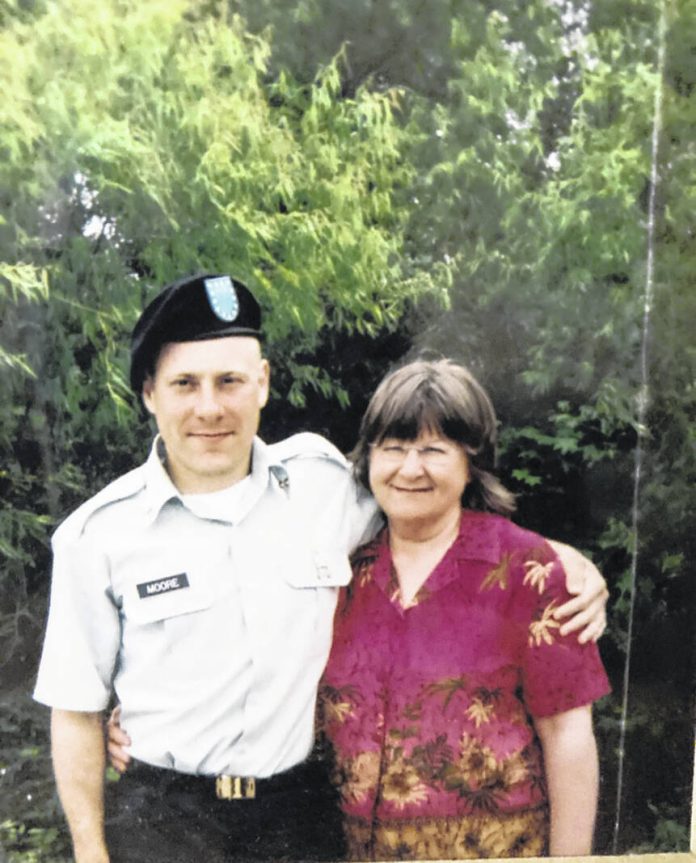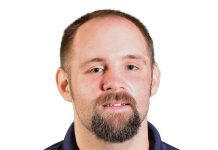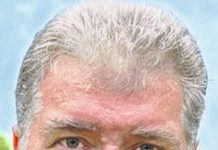
Pfc. Keith Jesse Moore and his mom, Susan Turley
According to NPR, On March 29, 2023, the U.S. Senate voted to “formally repeal the war authorization that justified the 1991 Gulf War and the 2003 Iraq War,” a war which ran from 2003 until 2011. On Oct. 14, 2006, Keith J. Moore, U.S. Army, died in a checkpoint south of Baghdad where he was serving as part of Operation Iraqi Freedom. He was 28 years old and died of a self-inflicted gunshot wound.
Suicide in the military continues to be a problem, and those charged with analyzing why this phenomenon occurs speculate that misuse of alcohol and drugs is a factor, but the question arises as to why the misuse occurs. Mental health disorders and psychosocial stressors are high on the list: anxiety disorder, manic-depressive disorder, PTSD, and Traumatic Brain Disorder.
Those left behind puzzle over the specific reasons for why their sons or daughters took their own lives. Gold Star mother Susan Turley, Keith’s mother, recalls him as an infant: “He was a colicky baby, weighed seven pounds and seven ounces at birth and was jaundiced. The several weeks they kept him in the hospital in an incubator were horrific for me, and I thought he was going to die. I pumped my breast to take my milk to the hospital, but he was allergic to it. He was sick quite a lot in his first six weeks.
“He was, however, thriving from pre-school until the fifth grade when his teacher told Susan that he ‘was gifted, too bright’ and ‘needed more opportunities.’” She and her husband, Cliff, enrolled him in the International School in San Francisco and had him tested. The results were “not a genius but pretty damn close.”
Susan reports, “He got caught up in drugs, but when he got clean and sober, he felt he had a duty to serve his country. He had always cared about environmental and global issues and felt like he was a white, privileged boy.
“Both his father and I were anti-war, against the Vietnam War, and I think young people at times choose to do the opposite of what their parents choose in order to demonstrate their independence.”
As a mother and as a professional, Susan indicates that every person’s journey in grief is unique, that all have their own stories. Further, she says that we should not compare journeys and that we should not have certain expectations for healing. She encourages those grieving to “let it unfold” and to “deal with what they are going through.”
Susan was prevented from letting her own grief unfold by the work she was doing as a chaplain before Keith’s death and afterwards at the Veterans Administration. She says, “Every time I went to work, I saw my son’s face in the faces of the veterans with whom I worked. This kept my wounds open. It was like being in the war zone myself, as chaplains are first responders.
“When I retired in 2009, I was physically and emotionally ill. My grief was debilitating, and I could barely function. I had been putting all my energy into work after which I just came home and collapsed. I blamed myself for Keith’s death, told myself I was not a good-enough mother. I made lists of times when I had not been loving enough, compassionate enough, supportive enough. I blamed myself for our having moved too much, for working too much, for not spending enough quality time with him- even though Keith had told me at one time, ‘Get over such talk. You were a great mother.’
“I was suffering from PTSD from the trauma of his death as well as other previous traumas.” She compares herself at the time, as they say in AA, of being guilty of “stinking thinking.”
In 2017, Susan and her husband Cliff bought a five-acre farm in the state of Washington. They were busy in the first three years clearing land, renovating the house, and planting vegetable, herb, and rose gardens. Susan decided to return to the painting she had always enjoyed, and she began to feel energy again. She stopped looking outside of herself for healing as she realized that she had to do it herself. She now has the help of a therapist, and she has accepted that she cannot know why her son took his own life and that she can’t change that. She also must forgive him for doing that as well as forgive others, including herself and God.
She now lives her life as a bereaved mother, but that is only part of her identity. She concludes that none of this is an “easy process but that it’s possible, that things will be different, that the life of fear and panic can dissipate.” And she reports, “A few months ago, I turned a corner in healing: I accepted that my life is now without my son and that I need to fully embrace my life anew. Every day is a new challenge to lead a life of forgiveness, acceptance, and integrating this loss as I continue the journey of living.”
NOTE: The toll-free number is 988 or go to https://bit.ly/2Wb0KE5.
Vivian B. Blevins. Ph.D., teaches telecommunication employees from around the country and students at Edison State Community College and works with veterans. You may reach her at 937-778-3815 or [email protected].




